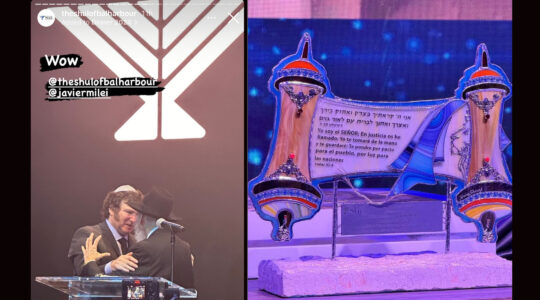PRAGUE (JTA) – With resurgent anti-Semitism in Europe, the Iranian nuclear threat and the European Union’s growing role in the Middle East, the European Jewish Congress surely plays a vital role representing the continent’s 3 million Jews.Vital, too, is who will speak for the organization. “In the eyes of Europe’s Jewish communities, there should be an engine fighting for the Jews with one voice,” said Tomas Kraus, chairman of the Czech Federation of Jewish Communities and an EJC board member. “We can’t have a different voice in Poland than say in Great Britain when talking to European leaders because, after all, we are facing the same problems.”That voice will be decided June 26 at the group’s general assembly in Brussels.In a contest that some observers have described as East versus West, a Russian billionaire is challenging the French incumbent for the EJC presidency.Several sources within the EJC say the race between Russian Jewish Congress President Moshe Kantor and Pierre Besnainou, president of the United Social Funds of France, is too close to call.Kantor promises to unite East and West in an organization in which regional tensions have flared. He also says he will make the leadership more democratic. But his critics worry that he is too close to the Kremlin to criticize the Russian leadership on Jewish issues.Besnainou, who is seeking his second two-year term as EJC president, has experience working with European politicians and enjoys a high profile in Israel. His sometimes iconoclastic style, however, has put off some who disagree with him.Their battle, part of a long-simmering rivalry, has been heated at times.For instance, Besnainou recently portrayed, in the Israeli media, a May conference sponsored by Kantor on nuclear proliferation as a threat to Israeli security, an accusation cast as absurd by the American and Israeli conference participants.The EJC contest comes in the wake of the battle earlier this month for leadership of the World Jewish Congress, of which the EJC is an affiliate.Ronald Lauder, the Jewish National Fund president and cosmetics heir, handily defeated Mendel Kaplan of South Africa for the WJC presidency June 10. He replaces Edgar Bronfman, who stepped down after nearly 30 years at the WJC helm.Many within the organization have speculated that Lauder will back Kantor because Besnainou supported Kaplan in the WJC race. Lauder could not immediately be reached for comment.Doubtless a key issue in the European election will be financial independence. The EJC receives most of its budget – slightly less than $1 million – from the WJC. Kantor reportedly is the largest private donor.Kantor and Besnainou, a millionaire businessman, will try to assure delegates that they can secure the additional donors needed to steer the organization toward self sufficiency.Established in 1986 as an affiliate of the WJC, the 41-country EJC is the only secular European group to lobby European governments and the European Union on behalf of Jewish causes. This means combatting anti-Semitism as well as promoting the political and security interests of Israel.Both candidates represent countries with the largest Jewish communities in Europe: France has some 600,000 Jews, Russia between 500,000 and 850,000.For a profile of Moshe Kantor, click here.For a profile of Pierre Besnainou, click here.





